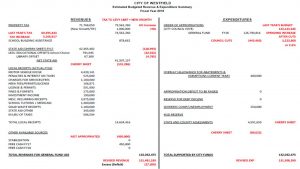This may be the last article I can write before the election, so I’d like to let everyone know my thoughts on the budget and taxes, and why I won’t be voting to burn up Stabilization Funds to reduce the tax increase.
First, it’s important to know that when the City Council gets the budget in June, we get estimated revenues and estimated expenditures. Taking the revenues in mind, we deliberated and recommended budget cuts to proposed expenditures. It takes seven votes to cut any particular line item in the budget (except for schools where we can only reduce the total budget).

City of Westfield Estimated Budgeted Revenue & Expenditure Summary
Fiscal Year 2018 (Submitted by Councilor Dave Flaherty)
The projected revenues and expenditures are shown in the report accompanying this article. The black numbers and text are exactly as presented by the Mayor prior to the City Council’s deliberations. The red numbers are the changes that have been made due to votes of the City Council or state aid changes, and some comments of mine to help explain things.
The budget as presented to us was $126,790,816 in general fund spending – an increase of about 3% over last year’s budget. In order to cover these costs, the estimated revenues included $74.5 million in property taxes, $41.5 million in state aid, $14.6 million in local receipts (taxes and fees), and the use of $450,000 from the city’s free cash account. You can clearly see this on the report. That $74.5 million property tax number is a 6% increase over last year, plus $1 million in estimated new growth. This is what was proposed by the mayor, and what was deliberated by the City Council.
Many, many people came to the City Council budget hearing and begged the City Council to cut the spending and reduce the tax increase. However, the council could only get seven votes to cut about $443,000 ($250,000 of which was for the Rail Trail engineering work that we hoped would be paid for with a Community Preservation Grant). This wasn’t enough cuts to significantly impact spending or taxes.
There has been a ton of negative feedback from residents and voters about this budget and the required tax increase to pay for the budget. So, some councilors and the mayor are considering draining money from the City’s Stabilization Account to reduce the tax increase. In my opinion, this is not something we should be doing. The budget should have been trimmed if taxpayers or councilors didn’t want this massive tax increase. Note: if the original plan was to use Stabilization Funds to balance the budget, that should have been done at budget time – not going into an election. Notice there’s a spot for that on this report (lower left section) and the mayor’s proposal has a ZERO in there. If the plan was to use Stabilization Funds to balance the operating budget, the deliberations about the budget would have been dramatically different, and maybe more cuts would have been suggested and approved.
As proposed, we were already considering taking $450,000 out of savings. I never like using Free Cash or Stabilization to balance a recurring increasing operating budget. It’s just not fiscally responsible to rely on one-time money for recurring growing expenses.
It turns out that the City Council never voted to approve the $450,000 withdrawal, so at budget time we were already short that $450,000. After the City Council budget cuts, and after the final State Aid numbers were released, we’re still short about $27,000.
Also, one of the issues we have is that we know several items on the Expense side were short-budgeted – meaning we’ll have to find money later in the year to cover those expenses. For example, the Snow and Ice budget is lower than the average actual expense, there are no police cars in the budget, and the overtime for Fire and Police are both well below average. Together, these line-items alone can add up to more the $1.2 million.
Based on the lack of cuts, we really do need the tax revenue to balance the budget. Taxpayers don’t want to hear this, and the City Councilor who failed to vote for budget cuts certainly don’t want to hear this, but that’s the reality, and that’s why we need to focus on the budget in June.
One option that’s being floated is to use Free Cash or Stabilization to reduce the taxes. However, this is a really bad idea, and particularly bad when we are approaching the Levy Ceiling (the maximum we can charge in Property Taxes). When we hit that Levy Ceiling, we may need these reserves to help us cover critical services. Currently we have a little more than $7 million in the Stabilization Account, and in June we had about $1 million in Free Cash. Note: we’ll get a new Free Cash number in the early Fall, and I’d expect it to be in the $1.5-$3 million range (including the $1 million from June). That sounds like a lot of money. But for a city our size, it’s really only about three weeks worth of money. We need those reserves to help our bond ratings, to provide a little cushion if the economy slows down, to pay for unexpected emergencies such as natural disasters, and to give us some wiggle room if we hit that Levy Ceiling. We should not be using this money to cover recurring growing operating expenses. The Massachusetts Department of Revenue provide cities and towns with “Best Practices” documents and with a list of suggested steps to take when approaching the Prop 2 ½ Levy Ceiling. All of these documents recommend only using Free Cash and Stabilization for one-time special projects or emergencies – not recurring budget expenses. When approaching the Levy Ceiling, they recommend building up the savings accounts and strictly managing the spending.
Using Free Cash or Stabilization to reduce taxes is fiscally irresponsible given our current financial situation and our long-term obligations. Not only that, it’s just going to push the big tax increase into next year when we’ll have to play this game all over again. This plan is an election year “cover your rear-end” proposal because the City Council couldn’t get enough votes to reduce the spending increases in the budget. I won’t be voting for it – just like I didn’t vote for the budget.
Regarding the election, I’m thrilled to see so many new candidates who are willing to serve. I’d recommend talking with as many of them as possible before you vote in the upcoming elections. Several will be having meet & greets in the coming weeks. Please show up and discuss your concerns. Please write “VOTE” on your calendars for November 7th. As we saw in the last election, every vote counts!
Have a wonderful summer.
Dave Flaherty
City Councilor
[email protected]


